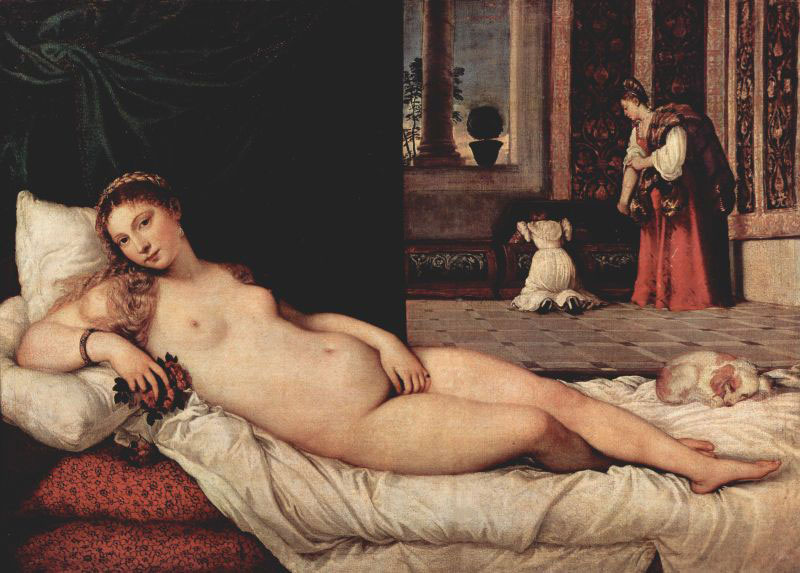“Men look at women. Women watch
themselves being looked at. This Determines not only most relations
between men and women but also the relation of women to themselves.
The surveyor of women in herself is male: the surveyed female. Thus
she turns herself into an object – and most particularly an object
of vision: a sight.” (Berger, 47) This is how John Berger describes
the male gaze. A women's main objective is to serve men's sexual
appetite, however, not have one of their own. This kind of thinking
has been embedded within society for centuries. One can go as far
back as to when the bible was written and come to the conclusion that
the writers created a hierarchical order between God, Adam and Eve,
with God being the divine, all-knowing creator, Adam being his agent,
and Eve merely being a submissive after though who is told to be
obedient and bear Adams children. Within art, primary way to advance
and promote the male gaze throughout history is through the paintings
of nudes. In them, women are always the center focus. Little boys or
men may be surrounding her, the attention however always lies on the
women. The female body is depicted hairless and although male actors
might make eye contact with the female, she always stares off to the
side, almost as if she was looking to lock eyes with the person
viewing the piece of art.
Patriarchy is a social construct in
which men dominate society and women take a passive, obedient back
seat to their male counterparts. It effects every aspect of live, may
it be social, within a family, or in the professional corporate
world. “Patriarchy is a political-social system that insists that
males are inherently dominating, superior to everything and everyone
deemed weak, especially females, and endowed with the right to
dominate and rule over the weak and to maintain that dominance
through various forms of psychological terrorism and violence.”
(Hooks, 18) It is heavily intertwined with the language we use as
well. Certain words seem to be reserved for the male sex, such as
successful, strong, dominant, tough, angry. Hooks brings up further
examples of patriarchy she experienced while growing up, being
punished for showing rage, as this was a feeling women should
eradicate, however her parents emphasized the importance of showing
her feelings. The opposite was true for her brother. He was punished
for showing his feelings, but encouraged to express rage.
Today, as much as we have evolved and
moved forward as a society, the male gaze and patriarchy can still be
found everywhere in our lives and as Hooks illustrates, it starts at
a very young age when these ides get embedded and drilled into the
minds of young generations. It is important to understand, however,
that this relationship is not one dictated by nature, but rather a
man made concept. It can be changed at any point in time, only it has
been manifested within societies for so long that change is
difficult. It is also necessary for men and women to, first of all
acknowledge the issue, and secondly be willing to fight together to
change it. It has to be a shared effort. As mentioned above, language
and the words we use and what we associate them with are a key
factor. Words should be gender neutral, it is inconceivable that
“strength” or “success” should be reserved or strictly
associated with males. This has to start in early parenthood,
teaching young boys that there lies no shame in showing your
emotions, playing with dolls, or loving the color pink. Likewise,
young women should be encouraged to be strong , independent and
successful. Once we manage to change this fundamental thought process,
we will be able to have a more equal, just and healthy society.
By Julian James Tsolakis
Work Cited
Berger, John. Ways of Seeing: Based on the BBC Television Series with John Berger. British Broadcasting Corp., 2012.
Hooks, Bell. The Will To Change: Men, Masculinity, and Love. Simon & Schuster, 2004.
Berger, John. Ways of Seeing: Based on the BBC Television Series with John Berger. British Broadcasting Corp., 2012.
Hooks, Bell. The Will To Change: Men, Masculinity, and Love. Simon & Schuster, 2004.

No comments:
Post a Comment